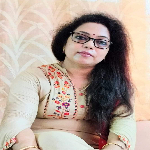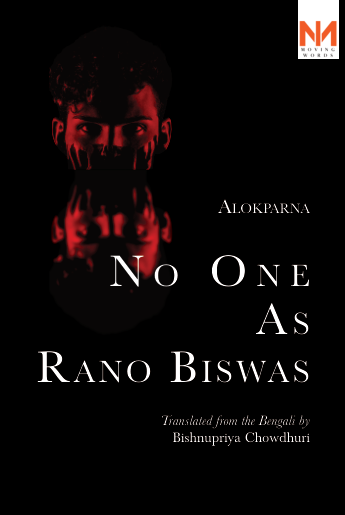TRANSLATED FROM THE BENGALI BY ANANYA SASARU
1
Rusha was watching them through the window. Like two playful swans, they stretch their necks while swimming in the pond. Every so often, the girl bursts into fits of giggles. The boy’s eyes are filled with the desire of a restless horse. They playfully splash water at each other, like a hero and heroine in a movie. The boy swims towards the girl. Pretending to be irked, she floats back at a distance. The boy follows her. Inside the water, he seizes the girl. The glow of the evening sun reflects on their bodies. The boy appears youthful, with a complexion as dark as a touchstone. As though an artist had meticulously crafted him, taking time to sculpt. Broad shoulders, a chest like a fortress gate, oily and firm, with the sunlight sparkling on his bare chest. The girl, not quite in her prime, seems to have retained the frozen essence of her youth. Rounded and full-figured, she looks like a tribal woman. A tremendously beautiful neck, a slim waist, long, shapely legs, and wet black hair cascading down her waistline. Like two snakes hissing around, their embracing arms occasionally splash water at each other.
“Hey, come down, Rusha! It’s time for the evening prayer.” The call from her mother-in-law prompts Rusha to hastily shut the window and make her way downstairs. A shiver courses through her spine. A subtle fragrance wafts from the depths of her lower body.
Rusha, originally a city girl, has tied the knot with a well-off family in the village. The lingering essence of turmeric and the scent of vermillion still clung to her body. Her husband holds a high-ranking position in the armed forces, and a job transfer led him to Bangalore, where he currently resides. The mother-in-law wants Rusha to remain in the village home. Moving to Bangalore with her husband right after marriage might weaken the emotional bonds with the in-laws. She says there’s plenty of time to spend with the husband.
On heading down the stairs, Rusha’s mother-in-law instructs, “Change your clothes and join me in the prayer room.”
Despite the winter chill, Rusha takes extra care in cleansing herself, going beyond what is necessary. When she is ready to go to the prayer room, holding a lamp, her mother-in-law adds, “Come along. Today, you’ll light the lamp throughout the entire house. You must learn the customs and traditions of this household.”
Up until now, Rusha has only been joining her elder sister-in-law in the evening ritual. However, the lamp has always remained in her sister-in-law’s hands, with Rusha handling only the incense sticks. Her sister-in-law took special precautions while lighting the lamp, saying, “You might find it hard to manage it, dear. The whole house is stacked with paddy. If, by any chance, the lamp’s flame touches the straw, it could spell trouble. It might be safer for you to distribute the incense sticks in all the rooms instead.” However, the elder sister-in-law won’t be able to carry out the evening ritual today. She is not well. Not being well means something different here — the ebb and flow of vital energy aligned with the monthly cycle of femininity. There’s this household practice of isolating both daughters-in-law for four specific days each month. When Rusha first encountered her menstrual cycle in this house, she promptly informed Niladri. With widened eyes, he responded, “Notify elder sister-in-law right away.”
“Why? Why inform the sister-in-law?”
“Oh, there are many rules and regulations in this house. If Mother finds out later, she will be very upset.”
Rusha had frowned with her thick eyebrows. What could be so upsetting about this? Anyway, she went ahead and informed her sister-in-law, who then passed on the news to the mother-in-law. Even on that chilly night, mother-in-law had made Rusha take a bath. She said, “On these days, keep separate the saris, underskirts, blouses, and shawls you will wear. Keep them away from Neelu’s clothes. Do not mix Neelu’s clothes with yours. And one more thing, you will not sleep on the same bed with Neelu for these four days. I will provide you with a thick quilt. Arrange it on the floor to make a bed, and use another to cover yourself”.
Trying to crash on the floor with just a quilt in this freezing weather? No way she’d catch a wink of sleep! Just as Rusha was gearing up to say something, her sister-in-law sneaked up behind the mother-in-law, giving her the signal to zip it. On her way out of Rusha’s room, the mother-in-law said in a raised voice, “I’ve granted you all so much freedom. My mother-in-law never allowed me to share a room with my husband during these four days. I had to sleep on a sack on the damp veranda floor.”
Later, in the dead of night, the sister-in-law sneaked in and whispered, “Shut the window facing the veranda, set up a bed on the floor, but crash on the bed next to your husband, hold him tight. Got it?” With a cunning grin, she leaned close to Rusha’s ear, covered her mouth, and murmured, “Rules are plenty, but so are the ways to bend them.”
Rusha cautiously followed her mother-in-law, swaying the lamp’s flame towards the Tulsi plant, the cowshed, the storage room, and the surroundings.
Since evening, everyone in this house sits glued to the television. Every now and then, Rusha joins them, sipping her evening tea. She isn’t a fan of the everyday domestic commotion stories that play on TV. Today, with a cup of tea, Rusha settles on the veranda with grills. The crescent moon above is shining like the apple in that famous ad, its light spilling over the yard, where golden bundles of harvested rice cover the entire space – something Rusha has never seen before. She misses her husband. When will she get to visit Bangalore? It’s not fun being alone here anymore. From this spot, she can see the little pond behind the house. The moon’s reflection moves like a bunch of small steps in the water. Rusha recalls her childhood when she used to roam around by the Ganges with her grandfather. Once, while gazing at a similar reflection of the moon in the Ganges, she had asked her grandpa, “Grandpa, where does the shadow of the golden ladder go?”
Grandpa had chuckled and, giving Rusha’s head a gentle pat, said, “Below the water lies the abode of Goddess Lakshmi. You can reach there by climbing those moonlit stairs. It’s not open to everyone, but you might find your way there with a pile of good deeds.”
Back then, Rusha believed that Goddess Lakshmi possessed immense wealth, which is why she had imagined the creation of the golden ladder. Recalling childhood tales, she couldn’t help but smile, thinking, “Maybe Grandpa was recounting the story of the ocean churning and the pot of nectar rising in Goddess Lakshmi’s hands.”
Despite scientific explanations dismissing mythological stories, a realm of gems and treasures lies beneath the water, submerged in the deep sea. Everything, from oil to forests, is tucked away in its depths. Suddenly, there is a commotion in the pond as a fish splashed around. Rusha’s train of thought takes a turn and she remembers the magical evening when two people were fooling around in the water. Who were they? They didn’t seem like a husband and wife. The boy appeared younger than the girl. Then what could they be? Lovers, perhaps?
2
In the villages of Bengal, the rice harvesting season is in full swing. Even at Rusha’s in-laws’ house, rice cutting is actively underway. About fifteen to sixteen men and women gather for this task each morning. The day commences a bit later than usual due to the winter season. As the sun god’s chariot slowly dispels the darkness, the clock in the octagonal house chimes loudly. Rusha, savouring her morning tea, gazes through the window to watch the Adivasi Munisas diligently bundling the harvested rice. Each of them holds a white aluminium sickle in one hand. Early in the morning, the women meticulously dress themselves, styling their hair beautifully and embellishing it with vibrant red Kasiganda flowers. The extraordinary elegance of their attire is truly distinctive. The remarkable beauty showcased in their clothing surpasses even what one might witness in a women’s beauty contest. A fabric is gracefully thrown across the chest, while another is artfully draped over the waist, allowing the subtle slits on either side of the waist to remain visible. The labour in the fields throughout the day keeps the women’s waistlines in excellent shape, devoid of any excess fat. Annually, during the Rabi and Kharif crop harvests, this assembly of Munisa women joins in the work at Rusha’s residence. They cultivate both winter and summer crops, a practice that Rusha has learned from her geography book. In this household, the primary focus is on cultivating Boro rice and Aman rice. Each household member is well-acquainted with the names of these Munisa women, who visit twice a year and gradually become like family members. The older ones are affectionately referred to as “Borobudi” (elder sister-in-law), while the younger ones are addressed as “Kakima” (aunt). Upon their first encounter with Rusha, everyone marvelled and exclaimed, “Oh, how beautiful—the new bride looks just like the actresses in movies!” However, a woman named Kheli approached Rusha, brought her face close to her ear, and remarked, “Oh my, such a tender young girl, far away from her husband. How her face has become sombre!”
On hearing Kheli, the girls and womenfolk giggled and laughed, leaning on each other in a merry uproar. Rusha, at first, couldn’t stand their unsophisticated antics. But as the days rolled on, bit by bit, Rusha began to befriend them. Every now and then, they’d show up with wild fruits—bananas, guavas, and berries—for Rusha. She’d never sunk her teeth into such untamed fruits, being raised on city apples and bananas. The daily consumption of apples and bananas had left a disagreeable taste lingering in Rusha’s mouth. Sitting on the porch in the sun, Rusha enjoys with her sister-in-law the wild fruits with a touch of tanginess, especially with a sprinkle of salt. The taste is refreshing. Rusha, in exchange, often treats them to tea with more milk. The mother-in-law doesn’t say anything. However, she is annoyed to see Kheli’s camaraderie with that boy, though she doesn’t express it verbally. Rusha has noticed something; all the girls and boys in their group follow Kheli’s lead. It’s as if Kheli is their leader. Even the father-in-law, uncles and all the elders treat Kheli well.
Rusha has learned a lot about them in the past few days. For instance, unlike the male Munis, women receive lower wages. While men can bear the weight of large paddy grains on their heads, women cannot carry as much. However, when it comes to Kheli, she excels, handling larger stacks of grain than men. That’s why she has better pay than anyone. On days when they work on rice-threshing machines, she always teams up with some man. She tells the girls, “I ain’t doing this with you. Your feet are all over the place, and you can’t even make a decent racket.”
Kheli speaks differently from the indigenous Munis. Even though she speaks their tongue when among them, she also tries to speak like the members in this house. On days when they’re busy threshing rice at home, they all gather in a circle on the sunny noon, opening their kettles. These kettles of theirs are somewhat unique – resembling big-mouthed jars. And they’ve got handles for swinging them. They directly scoop rice from the kettle and eat. Rusha stands on the roof, checking them out while they munch, just like back in school when they’d sit and eat from tiffin carriers. However, everyone eats their own food; nobody shares their meal with others. Only Kheli and that boy share their food. Rusha now knows the boy’s name – Shibu. One day, Rusha asked, “What do you bring for lunch every day in the kettle?”
All the women burst into laughter after what she said. Kheli answered, “Soaked rice and boiled potatoes.” Then, she playfully pointed at Shibu and joked, “He’s brought rat meat today.”
Rat meat! Just the thought of it made Rusha want to throw up. She has seen that whenever they spot a rat under the sheaves of rice or in the storage room, they get busy trying to catch it. While eating rice or working, they often burst into laughter, rolling on each other. It is a simple, sincere village laughter—unrestrained and unselfconscious, unlike the city folk who are mindful of their laughter. Once they start laughing, it seems to open up their hearts. They laugh wholeheartedly, without holding back, unlike the city people who are often reserved. For instance, they also laugh when they see Shibu and Kheli eating together, bathing together, and resting together after eating. It’s not just a smile or a smirk; they laugh right before each other. Come evening, as everyone heads home, laughter echoes in the air. Only Kheli and Shibu choose to linger behind.
Shibu ditches his field clothes and wraps himself in a stylishly flared T-shirt and pants, like a hero. Hanging a small mirror on the cowshed fence, he combs his hair. On the flip side, Kheli doesn’t bother with dressing up. Standing at a distance, she urges Shibu to hurry. Like in every household, men prompt women to hurry as they dress before going out. Once Shibu finishes dressing, he whisks Kheli away on his bicycle, whistling along. During the sunset, Rusha watches them from the rooftop, lifting clothes that were put out to dry.
Here’s the deal with women. Whether it’s two boys, two girls, or a boy and a girl together, the moment they’re seen hanging out, there’s no peace until you figure out what’s going on between them. Rusha feels the same way. One day, she asked her sister-in-law, “Hey, sis, those Kheli and Shibu who come to work in our house, what’s their relationship?” Sitting on the porch, shelling peas, she replied, “Shibu has been working in our house since he was quite young. Kheli has joined recently, just this year. I don’t really know. However, the girl is quite diligent at work.”
Rusha was not satisfied with the answer.
One morning, she saw her father-in-law asking, “Why hasn’t your sister come, huh, Kheli?”
“She cannot come. Her daughter is down with a bit of fever.”
“Look, buddy, you better not slack off again. The news says a depression might be formed. Before the rain, the rice must be threshed and brought home.”
For a few days now, Rusha has noticed that Kheli seems to be in a sombre mood. She’s not talking to anyone like she used to, not even sharing laughs with Shibu. She quietly goes about her work. When it’s break time, she quickly heads towards home.
One day at noon, when everyone opens their kettles to eat, Rusha notices Kheli sitting at a distance without eating. Everyone calls her to join, but she doesn’t go. That day, Shibu also doesn’t come near her. Shibu sits chatting with others, opening a kettle. Rusha slowly approaches Kheli.
“What happened? Are you feeling unwell? Why aren’t you eating?”
“Something doesn’t feel right, ma’am. The little one has a bit of viral fever.”
“Yeah, heard your sister’s daughter had a fever. Is she better now?”
Kheli casts a sidelong glance at Rusha, her face slightly contorted. Then, taking a deep breath, she utters, “No!” Just those words are enough to bring tears to her eyes. Rusha is astonished. It’s unimaginable how much someone can suffer for their sister’s daughter. Rusha turns towards the Munis sitting and laughing. They are happily eating. Rusha notices Shibu, focusing on him specifically. He also seems quite cheerful. When Rusha sees others crying, tears naturally come to her eyes. In childhood, friends used to tease her for this. Watching Kheli cry, she felt her eyes welling up as well. Seeing this, Kheli feels better. She feels someone participate in her sorrow for the first time. She feels very close to her as a result.
Rusha says in a soft voice, “What happened to you? Your face has completely dried up.”
Kheli quickly wipes her eyes and says, “Oh, it’s nothing.”
“It’s break time for you all. Everyone at home is watching TV. I don’t enjoy watching TV; so, I felt like talking to you. Mind if I sit here?”
Kheli looks at Rusha with surprised eyes. Then, with a slight smile, she says, ‘Sit, why not?’
Rusha settles down, perched on a heap of grain. She shares stories from her childhood. She mentions that she had never been in such an environment before. Kheli silently listens to her words. Now it is Rusha’s turn to inquire, ‘Tell me something about yourself. I find you quite intriguing. I want to know more about you.’
Kheli, gazing at Rusha, chuckles and says, ‘You’re really a nice one, sis. Ain’t nobody cared ’bout me in ages. Never seen tears wellin’ up for my sake. I’ve been a free spirit since I was a child. My sister had a rough go. So, I ended up with all the heavy liftin’ at home. She never tied the knot. Who would marry a sickly woman? I went to my in-law’s house. Even there, they handed me the chores—milking the cows, cooking, the whole shebang. I ain’t one to shy away from work, but it stung a bit when they skimped on my grub. Y’know, sis, if I toil away so hard, obviously I’m gonna be hungry! But they just won’t get it. My husband, he’s always been stubborn. Won’t do a lick of work, just lounges around, munching on leftovers and lazing in the sun.’
Rusha asks, “Don’t you stay at your in-laws’ house?”
“Gonna toil day and night and, not a morsel for me. And that fella, stumbling in all boozed up, lays his hands on me. Curse on him! Drowning in the drink, he lashed out one evening, but I kept quiet. Did not say a word. The little one was at my pa’s back then. Deep into the night, when the world was sound asleep, I straddled that drunkard’s chest and let my fists do the talking. His nose, it bled like a leaky tap. Frightened, I left home that very night. Never looked back, never turned ’round again.”
“No one from their family ever bothers fetching you?”
“Well, the husband does swing by, but I ain’t budgin’.”
“Then whose daughter is sick? Is she yours?”
“Yes, she’s my kid. She calls my sister ‘mom.’ Sis taught her that way. My mother says that she won’t ever have a young’un; let her call her ‘mom.'”
“What does your girl call you?”
With a lowered head, Kheli mumbles, “Copyin’ my sister, she calls me by my name.” Rusha watched how dim Kheli’s face got while uttering those words. Rusha pondered, ‘Ah, how a mother yearns to catch the word ‘Mom’ from her young one!’
The break time is over. Everyone has gone back to work. Kheli, too, seems to have exerted herself, lifting and carrying her own body as if with force. They have moved forward to where the rice is being threshed.
The winter sun doesn’t stay long at this hour, yet the body yearns for warmth. In summer, nobody wants the sun, but on those days, sunlight persists until 6:30 in the evening. Rusha, an economics student, concludes that when supply is low, prices go up. Hoping for warmth, she comes up to the rooftop and stands. Below, the Munis are diligently threshing the rice, and the rhythmic hum of the machine reverberates. Rusha looks around and sees Kheli working shoulder to shoulder with a man, threshing rice together. She thinks that when a woman becomes soft, just like everyone else, she even steps into danger with strength. Others also perceive her with the utmost consideration.
3
“Hey, your sister skipping work today as well?”
“Yeah, she’s not feeling well.”
“We could really use more help right now, and she’s not well,” complained her father-in-law with an annoying face.
Kheli doesn’t respond. All the Munis hang their rice kettles on the walls of the cowshed and walk down to the yard. They gather in two teams. One team is threshing rice with a machine, while the other is carrying the sheaves away with the sickles when the rice is threshed. Today, Kheli seems to be in a good mood. While working with the machine, Shibu and Kheli often tease each other. Seeing Rusha peeking at them from the kitchen, the annoyed mother-in-law said, “One loose woman she is! An old hag, messing with that young boy.”
The older sister-in-law exclaims, “Who are you calling a young boy? Shibu is at least 27-28 years old. He even got married last year.”
While chopping vegetables, Rusha inquires, “Shibu is already married?”
“Yes. Last summer, when he came to work, he shared the news himself. His in-laws gave three gold bangles for their daughter and a watch for Shibu. But they didn’t throw in a bike, and that really ticked him off!”
Rusha asks, “Doesn’t Shibu’s wife come to work?”
“I have heard his wife is very sickly. It’s been a long time since she went to her parent’s house for delivery. The son has turned six months old but Shibu still hasn’t brought her wife back.”
Rusha says, “Oh! Now I see! The wife has gone to her parents’ house. And Shibu is having a good time this way.”
The irritated mother-in-law exclaims, “Cut the nonsense and finish cooking right away!”
Since that day, Rusha and Kheli have begun to gel very well. When everyone takes their afternoon nap, Rusha brings her knitting and sits on the yard. Kheli also joins her.
Rusha talks quite informally with Kheli. She asks her, “Hey, you, do you know that Shibu has a wife?”
“Of course, I know.”
“And yet you fool around with him?”
Kheli chuckles and says, “You ain’t catchin’ on, are ya? Do ya reckon Shibu’s missus can handle a strapping lad like him? If it ain’t me, he’ll be cruisin’ with other gals. Won’t that wreck their marital bliss? And mind ya, I don’t do nothin’ for free.”
“What do you mean?”
“What do I mean! That cycle he’s ridin’? I’m the one who shelled out for it”.
Astonished, Rushi looks at Kheli with widening eyes.
“Why’re ya staring like that? In fancy houses like yours, men keep gals on the side. Well, I got me a fella. If I can toil in the fields with the men, weave baskets with paddy straws, and earn my own coin, feedin’ my mother, sister, and myself, then why the heck can’t I live my life on my own terms, just like the men? You tell me.”
Rusha feels like she can’t believe her own ears. Despite being educated, she can’t stand against her mother-in-law’s prejudices. And this uneducated village girl…
“Ya ain’t judgin’ me, are ya? I couldn’t care less about other people’s opinions. Can’t live on an empty stomach. The hunger in my belly ain’t the only one. Gotta satisfy the other kinda hunger too. Don’t stick around at your in-law’s just to show you’re a good wife. Live life on your own terms. Tell your man to take you away. Once gone, your vibrant youth ain’t comin’ back anytime soon.”
Rusha gazes in astonishment. Kheli looks like a tigress. Tigresses, after giving birth, send the tigers away. Rusha has heard that tigresses maintain fierce self-respect after childbirth. Protecting the children and holding the power to raise them high instills in them confidence.
4
It’s late at night now. Rusha is sitting by the window. She fails to get any sleep on that empty bed. The moon in the distant sky seems to be staring at her with a thousand questions. Rusha opens the window and extends her hand outside. The wind is blowing from the opposite direction. Typically, during the pre-monsoon season, the wind blows from the north. Now it’s coming from the south. The moonlight makes the banana trees near the pond look like ethereal souls. From somewhere, it seems like there’s a faint murmuring sound. Rusha turns towards the direction of the pond. The moonlight falls on the pond’s water, creating a rhythmic sound. Memories of her childhood’s golden stairs flood Rusha’s mind. As she looked towards the pond, it felt like the stair hadn’t sunk to the bottom but had risen from below the surface. Rusha can almost see in front of her eyes an indigenous, uneducated girl advancing with the changing winds of time. Behind the girl, there is a long line. Approaching closer, Rusha is amazed to see that most of the line is filled with unfamiliar faces! Kheli. Again, that childhood golden stair echoes in Rusha’s mind. As the line approaches the pond, Rusha is stunned to see that the girl in the front of the line is not a stranger! It’s Kheli.
Rusha, with wide eyes, gazes as Kheli leads a multitude of girls forward. Despite her efforts, Rusha can’t see the end of the line. The procession has surpassed the village, the city, the river, and the borders. Rusha can almost see, right in front of her eyes, a procession moving forward with Kheli at the helm. From all directions, countless women are joining this procession, making a melodious hum. Among these countless girls, Rusha is captivated to see one very familiar, very close, educated girl. She is smiling and waving at Rusha. Unbeknownst to herself, Rusha is also waving her hand in return…
Also, read a Persian prose, written by Moniro Ravanipour, translated by Marjan Modarres Sabzevari, and published in The Antonym:
Follow The Antonym’s Facebook page and Instagram account for more content and exciting updates.

































The storyteller masterfully delves into the complexities of women’s empowerment in village settings, offering a nuanced portrayal of how societal norms both constrain and are challenged by the characters. Through the lives of Rusha and Kheli, the story beautifully highlights the struggle for personal agency against the backdrop of tradition. It’s a powerful narrative that not only sheds light on the intricacies of rural life but also celebrates the resilience and courage of women navigating these spaces. The storyteller’s ability to weave these themes into a compelling and relatable narrative is commendable, making it a significant contribution to conversations around gender, tradition, and empowerment.